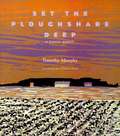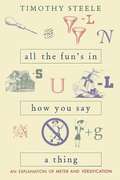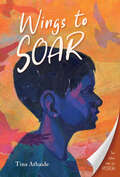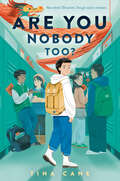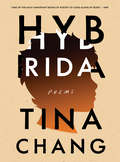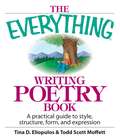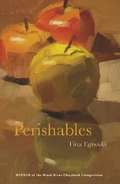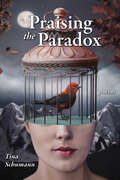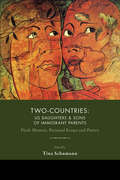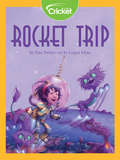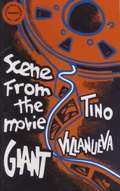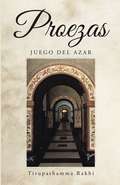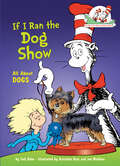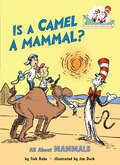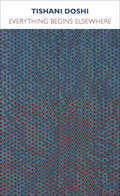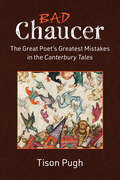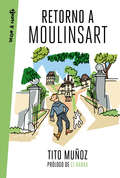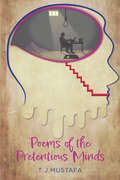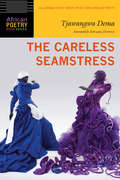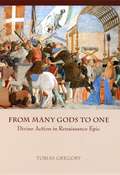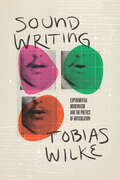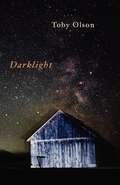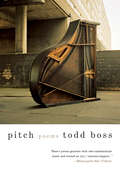- Table View
- List View
The Cambridge Companion to Shelley
by Timothy MortonPercy Bysshe Shelley (1792-1822) was an extraordinary poet, playwright and essayist, revolutionary both in his ideas and in his artistic theory and practice. This 2006 collection of original essays by an international group of specialists is a comprehensive survey of the life, works and times of this radical Romantic writer. Three sections cover Shelley's life and posthumous reception; the basics of his poetry, prose and drama; and his immersion in the currents of philosophical and political thinking and practice. As well as providing a wide-ranging look at the state of existing scholarship, the Companion develops and enriches our understanding of Shelley. Significant new contributions include fresh assessments of Shelley's narratives, his view of philosophy, and his role in emerging views about ecology. With its chronology and guide to further reading, this lively and accessible Companion is an invaluable guide for students and scholars of Shelley and of Romanticism.
Set The Ploughshare Deep: A Prairie Memoir
by Timothy MurphyWhen Timothy Murphy graduated from college, Robert Penn Warren advised him to go home and grow some roots. This memoir in prose, verse and woodcuts, depicts the consequences of Warren's advice for a writer who turned his back on cities and the academic world.
All The Fun's In How You Say A Thing: An Explanation Of Meter And Versification
by Timothy SteelePerfect for the general reader of poetry, students and teachers of literature, and aspiring poets, All the Fun’s in How You Say a Thing is a lively and comprehensive study of versification by one of our best contemporary practitioners of traditional poetic forms. Emphasizing both the coherence and the diversity of English metrical practice from Chaucer’s time to ours, Timothy Steele explains how poets harmonize the fixed units of meter with the variable flow of idiomatic speech. He examines the ways in which poets have used meter, rhyme, and stanza to communicate and enhance meaning. Steele illuminates as well many practical, theoretical, and historical issues in English prosody, without ever losing sight of the fundamental pleasures, beauties, and insights that fine poems offer us. Written lucidly, with a generous selection of helpful scansions and explanations of the metrical effects of the great poets of the English language, All the Fun’s in How You Say a Thing is not only a valuable handbook on technique; it is also a wide-ranging study of English verse and a mine of entertaining information for anyone wishing more fully to write, enjoy, understand, or teach poetry.
Wings to Soar
by Tina AthaideA historically relevant middle-grade novel-in-verse about a girl's resiliency when faced with hatred towards refugees. Readers of The Night Diary and Inside Out and Back Again shouldn&’t miss out.It's 1972 and Viva&’s Indian family has been expelled from Uganda and sent to a resettlement camp in England, but not all of them made the trip. Her father is supposed to meet them in London, but he never shows up. As they wait for him, Viva, her mother, and her sister get settled in camp and try to make the best of their life there.Just when she is beginning to feel at home with new friends, Viva and her family move out of the camp and to a part of London where they are not welcome. While grappling with the hate for brown-skinned people in their new community, Viva is determined to find her missing father so they can finish their move to Canada. When it turns out he has been sponsored to move to the United States, they have to save enough money to join him.Told in verse, Wings to Soar follows a resilient girl and the friendships she forges during a turbulent time."These rich, vivacious lines combine an insistence on self with undaunted hope. A supreme heart-changer."—Rita Williams-Garcia, Newbery Honor, National Book Award, Boston Globe/Horn Book Award, and Coretta Scott King Award Winner
Are You Nobody Too?
by Tina CaneAfter years of discomfort as the only Chinese student at her private middle school, Emily transfers to Chinatown's I.S. 23 for 8th Grade and ends up feeling more disconnected than ever. In this coming-of-age novel-in-verse, will Emily be able to find her way or will she lose herself completely?After a year of distance-learning, Emily Sofer finds her world turned upside down: she has to leave the only school she's ever known to attend a public school in Chinatown. For the first time, Emily isn't the only Chinese student around...but looking like everyone else doesn't mean that understanding them will be easy--especially with an intimidating group of cool girls Emily calls The Five.When Emily discovers that her adoptive parents have been keeping a secret, she feels even more uncertain about who she is. A chance discovery of Emily Dickinson's poetry helps her finally feel seen. . . but can the words of a writer from 200 years ago help her open up again, and find common ground with the Five?
Hybrida: Poems
by Tina ChangA stirring and confident examination of mixed-race identity, violence, and history skillfully rendered through the lens of motherhood. In this timely, assured collection, Tina Chang confronts the complexities of raising a mixed-race child during an era of political upheaval in the United States. She ruminates on the relationship between her son’s blackness and his safety, exploring the dangers of childhood in a post–Trayvon Martin era and invoking racialized roles in fairy tales. Against the stark urban landscapes of threat and surveillance, Chang returns to the language of mothers. Meditating on the lives of Michael Brown, Leiby Kletzky, and Noemi Álvarez Quillay—lost at the hands of individuals entrusted to protect them—Chang creates hybrid poetic forms that mirror her investigation of racial tensions. Through an agile blend of zuihitsu, ghazal, prose poems, mosaic poems, and lyric essays, Hybrida envisions a childhood of mixed race as one that is complex, emotionally wrought, and often vulnerable. Hybrida is a twenty-first-century tale that is equal parts a mother’s love and her fury, an ambitious and revelatory exploration of identity that establishes Tina Chang as one of the most vital voices of her generation.
Writing Poetry Book (The Everything )
by Todd Scott Moffett Tina D EliopulosGiving voice to ''what gets lost in translation'' is the challenge every poet faces. With The Everything Writing Poetry Book, that challenge just got easier. Featuring examples from works of celebrated poets and instruction on communicating your ideas, this clear and accessible reference helps you gain confidence as you find your own voice. Written by a team who each hold a master’s degree and teach creative writing and literature, this easy-to-follow guide has all you need to take your work to the next level. - With this handy guide, you will learn to:Create meter and rhyme - Express your innermost thoughts - Use imagery and metaphor - Polish your word play - Find your own rhythm - Work with other writersand more - The Everything Writing Poetry Book helps you make the most of this rewarding craft - whether you’re a fledgling poet or a seasoned wordsmith.
Perishables
by Tina EgnoskiPerishables opens with a sister sitting calmly on a burning chair then moves out of the childhood home that seems so fragile that it might split along the equator like a rotten piece of stone fruit. It is a reckoning of those things, outside and in, that we must Handle With Care.
Praising the Paradox: Poems
by Tina SchumannA collection of poetry with &“resilience throughout and an awareness of the common world that both comforts and devastates&” (Dorianne Laux, award-winning author of Only As the Day Is Long). From Tina Schumann, recipient of the American Poet Prize from The American Poetry Journal and a Pushcart Prize nominee, comes a full collection of fifty-six poems reflecting on the concept of self, loss, fragility, and the constructs we must create in order to face the transient nature of life. Praising the Paradox was named a finalist in the National Poetry Series, The New Issues Poetry Prize, The Four Way Books Intro Prize, and others. It was also listed as a &“remarkable work&” in the Tupelo Press open submission period. &“A rich guidebook for a life—a grand companion. These deeply satisfying poems, with their lush images and fluid sound movements, unfold in elegance, settling the spirit. In every stanza, Schumann&’s honest voice feels compelling and humble . . . Nothing forced, nothing labored. What a treat.&” —Naomi Shihab Nye, author of The Tiny Journalist &“Tina Schumann&’s stunning new collection is extraordinary in its intelligence. She has organized her poems by locating the innumerable paradoxes in our lives, in our minds, in the world. Her book is brilliantly unique and, I dare say, unrepeatable; she owns this territory. And what is so important about a paradox? The answer is that paradox is what the world is made of. The other (necessary) ingredient here is feeling. Praising the Paradox will make you feel, think, and reflect. Schumann&’s lines will resonate in your heart. They will resonate in mine forever.&” —Kelly Cherry, author of Observing the Invisible
Two-Countries: US Daughters & Sons of Immigrant Parents: Flash Memoir, Personal Essays and Poetry
by Tina SchumannThe IPPY Award–winning anthology of poetry, memoir, and essays—&“accounts of assimilation and nostalgia, celebration and resistance&” (Rick Barot, author of The Galleons). This collection contains contributions from sixty-five writers who were either born and/or raised in the United States by one or more immigrant parent. Their work describes the many contradictions, discoveries and life lessons one experiences when one is neither seen as fully American nor fully foreign. Contributors include Richard Blanco, Tina Chang, Joseph Lagaspi, Li-Young Lee, Timothy Liu, Naomi Shihab Nye, Oliver de la Paz, Ira Sukrungruang, Ocean Vuong, and many other talented writers from throughout the United States. Winner of a Bronze Medal from the Independent Publisher Book Awards for Multicultural Nonfiction &“When you hold in your DNA two countries—the cultures, the languages, the delicious foods and stories—you embody richness. These writers know on the cellular level many-layered ways to live, to struggle, to love. Here are voices we need to hear, writers we need to read. This is a brilliant, timely book, an antidote to divisiveness.&” —Peggy Shumaker, former Alaska State Writer Laureate &“The poets and writers in Two-Countries show that one result of our ongoing national experiment is a rich deepening in our literature. We may be in perilous times as a country, but our writers have never been in more ferocious health.&” —Rick Barot, author of The Galleons
Rocket Trip
by Tina TwitoHop in your rocket ship for a trip to the stars! In this fantasy rhyming poem about flying through space, readers will visit Mars, the purple kitties of the planet Fuzz, and an asteroid inhabited by dinosaurs—all in plenty of time to return home for lunch!
Scenes from the Movie Giant
by Tino VillanuevaTino Villanueva recalls a scene from the movie "Giant" in which a Mexican American family is denied service at a restaurant and reflects on how the scene symbolizes the treatment of Mexican immigrants nationwide. His book-length poem captures the pain of feeling, and then forgiving, racism.
Proezas: Juego del azar
by Tirupathamma RakhiLa compilación de cosechas en pensamientos, coraza de nieves por alimentar almas desordenadas y escafandras aún por ser amaestradas, no hay tiempo para el razonamiento. <P><P>Hay un sendero que empezó con dudas, miedos, terrores y escalofriantes sueños que no dejan dormir en las noches de día. Donde las historias se quedan entre páginas blancas esperando a que sean escritas, diseñando fábulas en otros parajes, copos de sangre y lluvias de bochornosas miradas. <P><P>¿Andarán las palabras en busca de un cuerpo fértil de santos o de un jardín adornado de veneno para ser absorbido por un último aliento, suspiro hechizado? Si así es, ¿Quién es la porcelana descuidada con la gala de ausencias entre perlas de hierro, barro de pétalos? ¿Quién dejará huellas en las cenizas de un fénix en enjambre? <P><P>Por qué este repentino escalofrío en la tenebrosidad de las danzas sin melodías, sacudida de confusiones, memorias de veintidós años de reflejos. La compilación de cosechas en pensamientos, coraza de nieves por alimentar almas desordenadas y escafandras aún por ser amaestradas, no hay tiempo para el razonamiento.
If I Ran the Dog Show: All About Dogs (The Cat in the Hat's Learning Library)
by Tish RabeLaugh and learn with fun facts about humankind&’s best friend—dogs!—all told in Dr. Seuss&’s beloved rhyming style and starring The Cat in the Hat. &“I&’m the Cat in the Hat, and today we will go to the Short-Shaggy-Tail-Waggy Super Dog Show!&” The Cat in the Hat&’s Learning Library series combines beloved characters, engaging rhymes, and Seussian illustrations to introduce children to non-fiction topics from the real world! In this doggone fun book, readers will learn about: • the wide variety of dog breeds• their amazing bodies and senses• the growth stages of puppies• and much more! Perfect for story time and for the youngest readers, If I Ran the Dog Show also includes an index, glossary, and suggestions for further learning. Look for more books in the Cat in the Hat&’s Learning Library series!Cows Can Moo! Can You? All About FarmsHark! A Shark! All About SharksOh Say Can You Say Di-no-saur? All About DinosaursOn Beyond Bugs! All About InsectsOne Vote Two Votes I Vote You VoteThere&’s No Place Like Space: All About Our Solar SystemWho Hatches the Egg? All About EggsWhy Oh Why Are Deserts Dry? All About DesertsWish for a Fish: All About Sea Creatures
Is a Camel a Mammal? All About Mammals: All About Mammals (The Cat in the Hat's Learning Library)
by Tish RabeLaugh and learn with fun facts about mammals, from the land to the sea, the smallest (pygmy shrew) to the largest (blue whale), and more—all told in Dr. Seuss&’s beloved rhyming style and starring the Cat in the Hat! &“Yes, people are mammals—amazing but true! Oh, and cats in tall hats? Well...yes. We&’re mammals, too!&” The Cat in the Hat&’s Learning Library series combines beloved characters, engaging rhymes, and Seussian illustrations to introduce children to non-fiction topics from the real world! Journey around the world and discover: what makes an animal a mammalwhat the world&’s smallest and largest mammals arehow different mammals take care of their babiesand much more!Perfect for story time and for the youngest readers, Is a Camel a Mammal? All About Mammals also includes an index, glossary, and suggestions for further learning. Look for more books in the Cat in the Hat&’s Learning Library series!High? Low? Where Did It Go? All About Animal CamouflageThe 100 Hats of the Cat in the Hat: A Celebration of the 100th Day of SchoolA Great Day for Pup: All About Wild BabiesWould You Rather Be a Pollywog? All About Pond LifeHappy Pi Day to You! All About Measuring CirclesI Can Name 50 Trees Today! All About TreesFine Feathered Friends: All About BirdsMy, Oh My--A Butterfly! All About ButterfliesOh Say Can You Seed? All About Flowering PlantsInside Your Outside! All About the Human BodyIce is Nice! All About the North and South Poles
Everything Begins Elsewhere
by Tishani Doshi"Free of the habitual lyricism of Indian writers, [Doshi's] work is austere and beautiful. Her refreshing muscularity gives her a distinct voice, both as a woman and an Indian."-The London Times"A work of a striking, emerging talent, who is prepared to take risks in pursuit of sensual, emotionally engaged and passionate poetry."-Judge's citation, Forward PrizeIn her second book of poetry-and her American debut-Tishani Doshi returns to the body as a central theme, while extending beyond the corporeal to challenge the more metaphysical borders of space and time. These new poems are powerful meditations born on the joineries of life and death, union and separation, memory and dream, where lovers speak to each other across the centuries and daughters wander into their mothers' childhoods."After the Rains"After the rainsthe temple flowerslie like fallen soldiers-dirtied and bloodied pink.I want to get downon bended knee,gather each broken petalto my chest.Out there-where the river meetsthe ocean's mouth,it would be calledthe kiss of life,a resuscitation.But herewith the world washed clean,it is nothing but a trampling.Tishani Doshi is an award-winning poet, journalist, and dancer. She has written for newspapers such as the Guardian, International Herald Tribune, The Hindu Times, and the Financial Times. Her first novel, The Pleasure Seekers (Bloomsbury, 2010), has been translated into several languages. She lives in Chennai (Madras), India.
Bad Chaucer: The Great Poet’s Greatest Mistakes in the Canterbury Tales
by Tison PughAcclaimed for centuries as the “Father of English Literature,” Geoffrey Chaucer enjoys widespread and effusive praise for his classic Canterbury Tales—and rightfully so. Still, even the greatest of authors cannot claim perfection, and so Bad Chaucer: The Great Poet’s Greatest Mistakes in the Canterbury Tales analyzes his various missteps, missed opportunities, and other blunders in this peerless masterpiece. From a vexing catalog of trees in the Knight’s Tale to the flirtations with blasphemy in the Parson’s Tale, this volume progresses through the Canterbury Tales story by story, tale by tale, pondering the most egregious failing of each in turn. Viewed collectively, Chaucer’s troubles stem from clashing genres that disrupt interpretive clarity, themeless themes that undermine any message a tale might convey, mischaracterized characters who act without clear motivation, purposeful and otherwise pleasureful badness that show Chaucer’s appreciation for the humor of bad literature, and outmoded perspectives that threaten to alienate modern readers. Badness is not always to be lamented but often celebrated, even cherished, for badness infuses artistic creations with the vitality that springs from varied responses, spirited engagements, and the inherent volatility of enjoying literature. On the whole, Bad Chaucer: The Great Poet’s Greatest Mistakes in the Canterbury Tales swerves literary criticism in a new direction by examining the provocative question, for too long overlooked, of what this great author got wrong.
Retorno a Moulinsart
by Tito MuñozTito Muñoz, un poeta excelente que además ha escrito canciones para artistas tan relevantes como Serrat o Ruibal, publica ahora en Verso&Cuento. Estas páginas son una invitación a pasear en pantalón corto o con el uniforme de las teresianas y una tirita en la rodilla por el paisaje de la infancia, los primeros besos y las fotografías de veranos antiguos, rumbo al sótano de Moulinsart, donde se conserva el tesoro de la memoria trazado en línea clara. Con una mirada cínica, callejera y sin concesiones, Tito Muñoz se recrea en la belleza de la invención con el firme propósito de, como recomendaba Ángel González, mantener sucia la estrofa y escupir dentro. Así que, ¡mil rayos, marinero de agua dulce, bachi-bazuk de los Cárpatos!, abre el libro por donde caiga y deja que la poesía de sus páginas te posea y haga cosquillitas en tus vísceras. Reseña:«En este libro, Tito nos va dando una de cal y otra de arena sin hacer apenas aspavientos, sin despeinarse, sin esfuerzo aparente; saca del sombrero el imaginario de la niñez y, cuando te descuidas, esboza la decadencia del pesar de los días o le da la vuelta a la sonrisa huyendo de los sueños».Fragmento del prólogo de El Kanka
Poems of the Pretentious Minds
by Tj MustafaPoems of the Pretentious Minds features a wide array of self-indulgent, darkly comical but heart-wrenching poetry that covers many topics such as love, family, friendship, death, sex addiction, abuse, anxiety, depression, suicide, mental turmoil, the city of London, various other locations around the UK and the intricacies of the world itself. Some of the poems also explore the contradiction of humanity and how one can appreciate the minute things in life, whilst others delve deeper into the human condition and how our emotions can ultimately cloud our judgement. Later poems take a more autobiographical approach and instead focus on the poet himself, detailing his personality, conflicting emotions, life experiences, deep-rooted thoughts and his overall outlook of the world. Most of the poems have a sharply satirical edge to them, particularly the ones that focus on modern-day society as a whole, and real life events that have sparked mass debate and controversy.
The Careless Seamstress (African Poetry Book)
by Tjawangwa DemaThis dazzling debut announces a not-so-new voice: that of the spoken-word poet Tjawangwa Dema. Winner of the Sillerman First Book Prize for African Poets, Dema’s collection, The Careless Seamstress, evokes the national and the subjective while reemphasizing that what is personal is always political. The girls and women in these poems are not mere objects; they speak, labor, and gaze back, with difficulty and consequence. The tropes are familiar, but in their animation they question and move in unexpected ways. The female body—as a daughter, wife, worker, cultural mutineer—moves continually across this collection, fetching water, harvesting corn, raising children, sewing, migrating, and spurning designations. Sewing is rendered subversive, the unsayable is weft into speech and those who are perhaps invisible in life reclaim their voice and leave evidence of their selves. As a consequence the body is rarely posed—it bleeds and scars; it ages; it resists and warns. The female gaze and subsequent voices suggest a different value system that grapples with the gendering of both physical and emotional labor, often through what is done, even and especially when this goes unnoticed or unappreciated. A body of work that examines the nature of power and resistance, The Careless Seamstress shows both startling clarity of purpose and capaciousness of theme. Using gender and labor as their point of departure, these poems are indebted to Dema’s relationship to language, intertextuality, and narrative. It is both assured and inquiring, a quietly complex skein that takes advantage of poetry’s capacity for the polyphonic.
From Many Gods to One: Divine Action in Renaissance Epic
by Tobias GregoryEpic poets of the Renaissance looked to emulate the poems of Greco-Roman antiquity, but doing so presented a dilemma: what to do about the gods? Divine intervention plays a major part in the epics of Homer and Virgil—indeed, quarrels within the family of Olympian gods are essential to the narrative structure of those poems—yet poets of the Renaissance recognized that the cantankerous Olympians could not be imitated too closely. The divine action of their classical models had to be transformed to accord with contemporary tastes and Christian belief.From Many Gods to One offers the first comparative study of poetic approaches to the problem of epic divine action. Through readings of Petrarch, Vida, Ariosto, Tasso, and Milton, Tobias Gregorydescribes the narrative and ideological consequences of the epic’s turn from pagan to Christian. Drawing on scholarship in several disciplines—religious studies, classics, history, and philosophy, as well as literature—From Many Gods to One sheds new light on two subjects of enduring importance in Renaissance studies: the precarious balance between classical literary models and Christian religious norms and the role of religion in drawing lines between allies and others.
Sound Writing: Experimental Modernism and the Poetics of Articulation
by Tobias WilkeConsiders the avant-garde rethinking of poetic language in terms of physical speech production. Avant-garde writers and artists of the twentieth century radically reconceived poetic language, appropriating scientific theories and techniques as they turned their attention to the physical process of spoken language. This modernist “sound writing” focused on the bodily production of speech, which it rendered in poetic, legible, graphic form. Modernist sound writing aims to capture the acoustic phenomenon of vocal articulation by graphic means. Tobias Wilke considers sound writing from its inception in nineteenth-century disciplines like physiology and experimental phonetics, following its role in the aesthetic practices of the interwar avant-garde and through to its reemergence in the postwar period. These projects work with the possibility of crossing over from the audible to the visible, from speech to notation, from body to trace. Employing various techniques and concepts, this search for new possibilities played a central role in the transformation of poetry into a site of radical linguistic experimentation. Considering the works of writers and artists—including Raoul Hausmann, Kurt Schwitters, Viktor Shklovsky, Hugo Ball, Charles Olson, and Marshall McLuhan—Wilke offers a fresh look at the history of the twentieth-century avant-garde.
Darklight
by Toby OlsonAuthor of ten novels (among others The Life of Jesus, Seaview and Utah) and over 20 collections of poetry (including We Are the Fire - Selected Poems, and Human Nature, both from New Directions), Toby Olson's new collection demonstrates that the passage of time has only sharpened his narrative voice. Toby Olson is a story-teller, puckish and avuncular by turns, and this new collection will delight his many admirers.
Human Nature: Poems
by Toby OlsonOlson's first book of new poetry in sixteen years. Human Nature is the poet and novelist Toby Olson's first book of new poetry since We Are the Fire (New Directions, 1984). The intervening years saw five of his novels published to strong critical acclaim. "But," says Olson, "one day I woke from fiction to discover I'd not written a poem in close to ten years. How to return to poetry after being away from it so long?" Certainly not in repetition of things done before. In Human Nature, Olson joins the novelist's art to the poet's reflections of friends and events and times gone by. When memory fades, replaced by story, the reader of these remarkable narrative meditations begins to realize the ways in which poetry might disclose different truths, born of the reinvention of experience. "In Human Nature," says Olson, "even the most autobiographical poems let fiction in."
Pitch: Poems
by Todd Boss2012 Poetry Midwest Booksellers Choice Award winner "[Todd Boss] can make any rhyme feel like a concealed weapon." --Sherman Alexie With poems about loss, home, marriage, and the inner music of our lives, Pitch is a series of variations on an overturned piano. By turns bright and dark like the keys on a keyboard, these poems demonstrate the range of one of contemporary poetry's most musical poets, a master of internal rhyme. from "Overtures on an Overturned Piano" . . . our hi-beams played across the gleaming bed of snowdrifted bramble where it lay, moaning chaotically . . .

